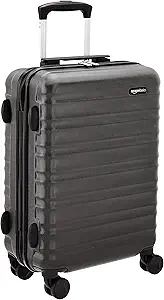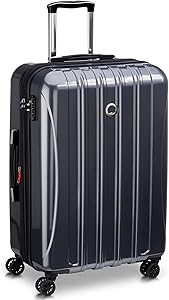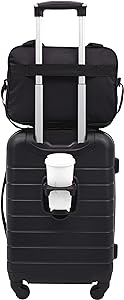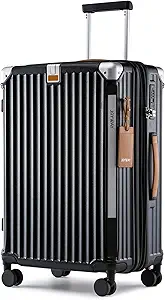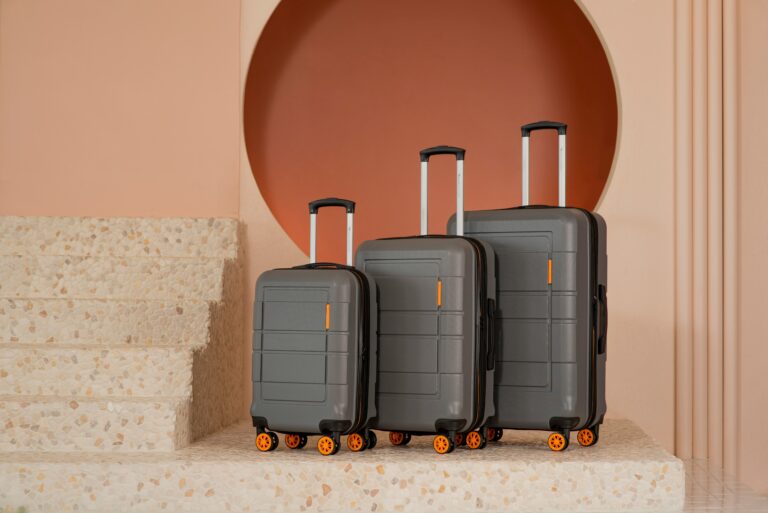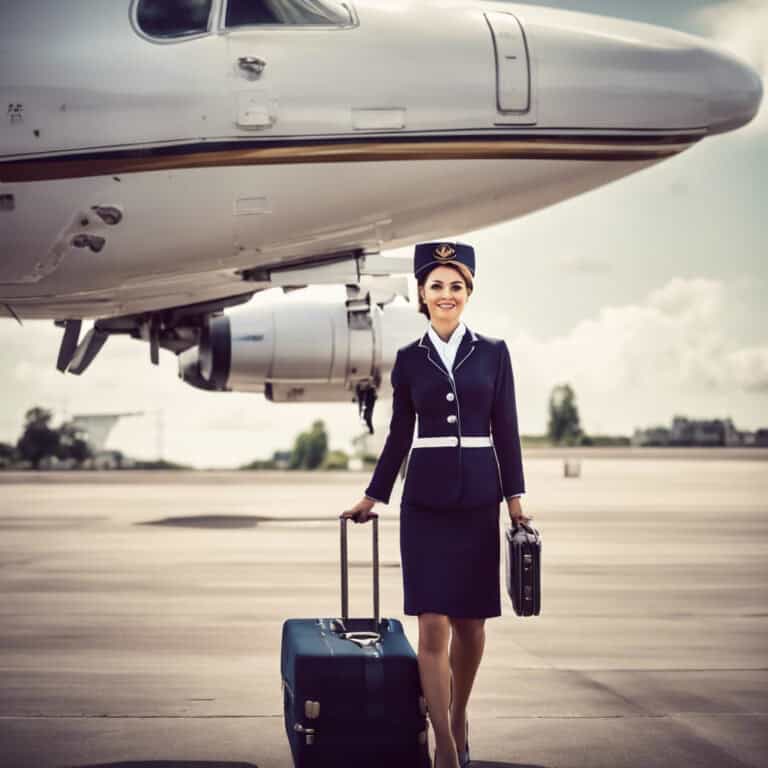Traveling is one of life’s greatest joys, yet it often comes with its own set of challenges—especially when it comes to packing. One of the most important decisions every traveler faces is whether to use carry-on or checked luggage. Understanding the differences between these two types of luggage can help you streamline your travel experience, save money, and ensure that you have everything you need during your journey. In this article, we will delve into the definitions, advantages, disadvantages, and key considerations for each type of luggage. We’ll also highlight some popular products available on Amazon to help you make the best choice for your travels.
What is Carry-On Luggage?
Carry-on luggage refers to the bags that you can take with you onto the airplane. These bags are stowed in the overhead compartments or under the seat in front of you. Most airlines have specific size restrictions for carry-on bags, typically allowing dimensions of around 22 x 14 x 9 inches. However, these limits can vary by airline, so it’s essential to check before you travel.
Advantages of Carry-On Luggage
-
Avoid Baggage Fees: Many airlines charge fees for checked bags. By using a carry-on, you can save money on your flight.
-
Time-Saving: You can skip the long lines at the check-in counter and baggage claim, making your travel experience smoother and faster.
-
Security: Keeping your belongings with you means you have more control over them. You don’t have to worry about lost luggage or theft.
-
Access to Essentials: With a carry-on, you have immediate access to your personal items, snacks, or any necessities during the flight.
Disadvantages of Carry-On Luggage
-
Limited Space: Carry-ons can only hold a limited amount of clothing and gear, which may not be sufficient for longer trips.
-
Weight Restrictions: Airlines often impose weight limits on carry-on bags, which can be challenging if you tend to pack heavy.
-
Inconvenience: Carrying a bag through the airport can be cumbersome, especially if you have connecting flights or layovers.
What is Checked Luggage?
Checked luggage is any bag that you hand over to the airline at the check-in counter. This luggage is stored in the cargo hold of the aircraft and can be retrieved only upon arrival at your destination. Most airlines allow checked bags to weigh up to 50 pounds (23 kg), with size limitations usually around 62 linear inches (length + width + height).
Advantages of Checked Luggage
-
More Space: Checked luggage offers significantly more room, making it ideal for longer trips or for travelers needing extra gear, such as sports equipment or baby supplies.
-
Ease of Travel: You don’t have to carry your bags through the airport. Simply drop them off and pick them up upon arrival.
-
No Weight Restrictions on Carrying: As long as you stay within the airline’s weight limit, you can pack heavier items without worrying about carrying them.
Disadvantages of Checked Luggage
-
Baggage Fees: Many airlines charge for checked luggage, which can add up, especially if traveling with a family.
-
Waiting Time: You’ll need to wait at the baggage claim after your flight, which can add time to your overall travel experience.
-
Risk of Loss: There is always a chance that your checked luggage could be lost or delayed, leaving you without your belongings for a period.
Comparing Carry-On and Checked Luggage
| Feature | Carry-On Luggage | Checked Luggage |
|---|---|---|
| Size | Smaller, under 22x14x9 in | Larger, typically 62 in total |
| Weight Restrictions | Usually around 15-25 lbs | Typically up to 50 lbs |
| Fees | Often free | Often incurs fees |
| Access | Immediate access | Accessible only upon arrival |
| Convenience | Must be carried | Checked in and retrieved |
| Risk of Loss | Low | Moderate to high |
Tips for Choosing Between Carry-On and Checked Luggage
When deciding which type of luggage to use, consider the following factors:
1. Duration of Trip
For short trips (1-3 days), a carry-on is usually sufficient. However, for longer trips (4 days or more), checked luggage may be necessary to accommodate all your essentials.
2. Type of Travel
If you’re traveling for business, a carry-on might be more appropriate for quick access to important items. Conversely, if you’re going on a vacation with activities that require additional gear (like skiing or camping), checked luggage might be a better choice.
3. Airline Policies
Always check the specific airline’s policies regarding baggage size, weight, and fees. Some low-cost airlines are stricter about carry-on dimensions and may charge for anything that exceeds their limits.
4. Personal Preferences
Consider your comfort level. If you dislike lugging bags through airports, a checked bag might ease your travel experience. On the other hand, if you prefer to keep your items close, opt for a carry-on.
Recommended Carry-On Luggage from Amazon
Here are a few popular carry-on luggage options available on Amazon that cater to various travel needs:
1. Samsonite Winfield 3 DLX Hardside Luggage
- Size: 20 inches
- Features: Scratch-resistant surface, 360-degree spinner wheels, and a TSA-approved lock.
2. Travelpro Platinum Elite Expandable Spinner Wheel Luggage
- Size: 21 inches
- Features: Expandable design, multiple pockets, and a durable nylon fabric.
3. AmazonBasics Hardside Spinner Luggage
- Size: 20 inches
- Features: Lightweight hardshell, 360-degree spinner wheels, and a built-in TSA lock.
Recommended Checked Luggage from Amazon
For those considering checked luggage, here are some excellent options:
1. Samsonite Freeform Hardside Expandable Luggage
- Size: 28 inches
- Features: Lightweight, expandable, and 360-degree spinner wheels.
2. AmazonBasics Softside Spinner Luggage
- Size: 28 inches
- Features: Multiple zippered pockets, durable fabric, and a telescoping handle.
3. Delsey Paris Helium Aero Hardside Luggage
- Size: 25 inches
- Features: Sleek design, double spinner wheels, and a TSA-approved lock.
Packing Tips for Both Luggage Types
Carry-On Packing Tips
- Roll Your Clothes: Rolling can save space and minimize wrinkles.
- Utilize Packing Cubes: These help organize your items and can make packing and unpacking much easier.
- Prioritize Essentials: Keep important items like medications, travel documents, and electronics easily accessible.
- Limit Liquids: Remember the TSA’s 3-1-1 rule: liquids must be in containers of 3.4 ounces or less and fit into a single quart-sized bag.
Checked Luggage Packing Tips
- Use Compression Bags: These can significantly reduce the volume of clothing, allowing for more items in your suitcase.
- Place Heavy Items at the Bottom: This helps balance the suitcase and makes it easier to carry.
- Secure Fragile Items: Use soft items like clothing to cushion fragile items within your checked bag.
- Label Your Bag: Ensure your luggage has identification tags to help recover it in case it gets lost.
The Emotional Aspect of Packing
Packing is often more than just a logistical challenge; it can be an emotional one as well. For many travelers, the act of choosing what to bring along can evoke memories and aspirations. A carefully selected piece of clothing might remind you of a special occasion, while your favorite book might symbolize the relaxation you hope to find during your trip. This emotional connection can influence whether you opt for carry-on or checked luggage.
The Freedom of Carry-On
Traveling with only a carry-on can feel liberating. You can easily move from one location to another without being weighed down by heavy bags. This freedom allows you to be more spontaneous—whether that means taking an unplanned detour to a local market or deciding to stay an extra night in a charming town. The minimalist approach of carry-on luggage encourages a lighter, more adventurous spirit.
The Comfort of Checked Luggage
On the other hand, checked luggage can provide a sense of comfort. For travelers who prefer to be prepared for any situation—weather changes, unexpected events, or various activities—having more packing space allows for versatility. Checked bags can accommodate larger items, such as jackets, shoes, and even specialized equipment for hobbies or sports. This comfort can make you feel more at home, no matter where you are in the world.
Cultural Considerations
When deciding between carry-on and checked luggage, it’s also worth considering cultural norms and expectations at your destination. In some cultures, packing light is seen as a virtue, while in others, travelers are expected to have a variety of clothing options and gear.
Travel Etiquette
In certain regions, travelers might be judged based on their packing choices. For instance, in countries where personal presentation is of utmost importance, having an appropriate outfit for every occasion may sway you toward checked luggage. Alternatively, in areas known for their fast-paced lifestyle, locals might appreciate the efficiency of travelers with carry-ons.
Technology and Luggage
As technology continues to evolve, so do our options for luggage. Smart luggage is becoming increasingly popular, offering features like GPS tracking, built-in chargers, and remote locking mechanisms. These innovations can enhance both carry-on and checked luggage experiences.
Smart Carry-On Options
- Wrangler Smart Carry-On:
- This carry-on features a built-in battery for charging devices and integrated tracking technology.
Smart Checked Luggage Options
- Joyway Smart Checked: While designed for carry-on, this option offers smart features, such as a removable battery and a sleek design, suitable for checked baggage as well.
Final Thoughts
The choice between carry-on and checked luggage ultimately depends on your individual travel needs and preferences. By understanding the key differences, advantages, and disadvantages of each type, you can make an informed decision that enhances your overall travel experience. Whether you opt for the convenience of a carry-on or the spaciousness of checked luggage, the right preparation can lead to a smoother, more enjoyable journey.
When packing for your next adventure, consider the products and tips mentioned in this article to optimize your luggage choice and packing strategy. Remember, the journey is just as important as the destination, and being well-prepared can help you focus on making lasting memories along the way. Safe travels!






